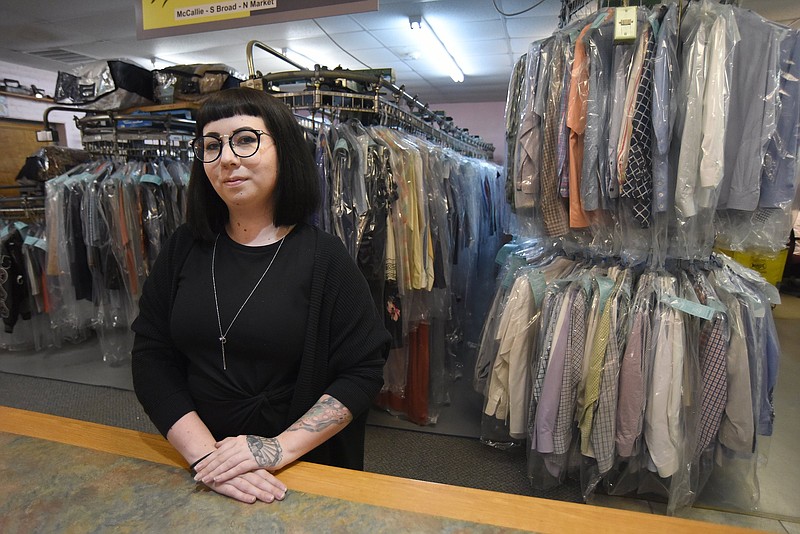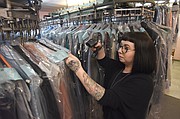Gordon's Cleaners has been around for 68 years, taking in piles of the wrinkled and dirty and giving back stacks of the clean and pressed.
But when people stopped buttoning up their work clothes to go to the office, and caterers stopped throwing down white tablecloths for big events, things got quiet in a hurry.
"We're down 58% year-over-year," says Roger Gass, who bought the business in 2018 after working there for 40 years. "It's horrible. I've used up the company's savings, my personal savings, my retirement. There's not a lot we can do."
As the long-term economic effects of the pandemic come into focus, the hit to small businesses that relied on people to be out and about every day are becoming clear. More than 82% of the jobs lost since February have been service jobs, according to the U.S. Chamber of Commerce.
Travel, lodging and restaurants have been hit particularly hard by shutdowns and social distancing measures, but businesses built around what we wear when we go out have also felt the effects.
When a competitor closed and sent all their shirt-cleaning business his way, Gass was taking in thousands of shirts a week. "He was doing 1,000 to 1,550 shirts a day, so I took over the contract," he says. "Now I'm doing 50 shirts a day."
His business, which has three locations, employs about 20 people.
"We usually do a good Christmas bonus for them, but we can't do it this year," he says. "We've been doing it for 68 years."
When the pandemic first hit, Gass started offering delivery to his customers, but not many took him up on it. But he's hoping the small, positive shifts he's starting to see in the business might take hold and grow.
"Sales tax last month was a little encouraging," he says. "It's still half what it was this time last year, but I'm seeing a gradual increase."
Local clothing boutiques have had to get creative and collaborative to hang on through the pandemic.
Terri Holley opened Embellish 15 years ago as a small shoe boutique on Frazier Avenue, then expanded her space and her offerings at Warehouse Row 11 years ago. When her business had to shut down in March, the shop fast-tracked their new website to make online ordering possible.
"We didn't do a lot of business on it, but we were grateful to have it out there," she says.
The shop reopened in May, but business was extremely slow for a while - down more than 50%. But she has seen things pick up in the last month or two, and she's offering curbside service and delivery, Holley says.
"Business is still down, but it's nowhere near what it was," she says. 'We're doing everything we can to provide a safe environment for staff and clients - constantly cleaning, wearing masks, enforcing masks in the store.
"We have to keep people safe," she says. "If we don't have our health, we don't have a business, anyway."
The boutique also ramped up its marketing efforts, which she had always preferred to keep light, Holley says.
"We were putting videos on Instagram, sending emails every day, I started putting myself out there, putting the staff out there," she says. "Not one person complained and, more importantly, it resulted in sales. We're just in survival mode, and everyone understands that."
Another key to weathering this time has been support and collaboration with other boutiques in town, including Antibes, K:: A Boutique by Katherine Roberts, Abby Lane and the Blue Collection, Holley says.
The stores teamed up to have a big inventory sale at the Westin in September, largely to move out the spring inventory they had just gotten in when the shutdowns hit.
"It was a huge success," Holley says. "Even though we weren't making any money, we sold it below what we paid for it, we had to move that inventory."
Local boutique owners know there is plenty of room for everyone to succeed, and they try to help each other, says Katherine Roberts Burger, who opened K:: A Boutique by Katherine Roberts in 2011.
"We are all female-owned, and we want to support female entrepreneurs," she says. " Everybody wants everybody to stay in business and succeed."
Her business has been down by as much as half, Burger says. "It's pretty brutal," she says.
But she has come through what she hopes was the lowest time and is determined to keep her store afloat, she says.
"I can tell you now we'll stay in business," Burger says. "Back in May I definitely had a moment when I felt otherwise."
Selling online helped her keep going during the shutdown, and her suppliers have quickly adjusted to life online in place of the shows that had been a mainstay of the industry, she says.
"I've been amazed by how everyone has shifted their reality and made it work," she says. "The showroom owners and reps have gone above and beyond to keep things moving."
The experience of weathering this crisis has been humbling, Burger adds, in part because it has shown her how supportive the community is of small business.
"It's occurred to people more than ever that if these stores start going under, you lose a part of the heartbeat of the community," she says.
Pierre Dabit is the third generation of clothiers to run Giorgio Men's Warehouse on Market Street, which first opened in 1975 in the heart of downtown.
Business is down 50% to 60%, and the shop was closed from March 21 to May 7, but Dabit is certain his business will still be right where it's been for 45 years when this crisis passes.
"I think we'll come out stronger in the long run," he says. "Pressure makes diamonds."
The shop manufactures its own Sterling Sewn brand, and Dabit has launched two online businesses to expand the reach of that brand - mensuits.com and weddingsuits.com.
Those online businesses are still in their early stages, but continuing to evolve the business and staying true to the traditions he learned growing up at the store with his grandfather and mother keeps him focused on the future, Dabit says.
"Once it's in your blood, that's it," says Dabit, who says the multi-generational relationships he has with longtime customers and their families are precious to him. "Those relationships are hard to give up."
And as difficult as 2020 has been, he has seen tough times before, Dabit adds.
"I was here in the early '90s, when downtown died," he says. "I would like to say there's a little more hope right now - back then, there was no end in sight."
Not that it's been easy to get through 2020, he adds.
"The pandemic hit at the worst possible time for us," he says. "We lost prom season, wedding season. Easter, graduation. Spring is typically our busiest season."
His wedding business recovered a little in the fall, but office clothing and suits for professional events don't show much sign of rebounding, he says. Planning for 2021 is nearly impossible, he adds.
"It's more praying than planning," Dabit says. "Our regular business is nowhere near what it should be."
READ MORE
* Might as well: Entrepreneurs across the country are going for it, anticipating better days ahead
* On a roll: For some Chattanooga businesses, demand for what they do is at fever pitch
* Wear it out: Local businesses expand their brands through smart, fun swag

